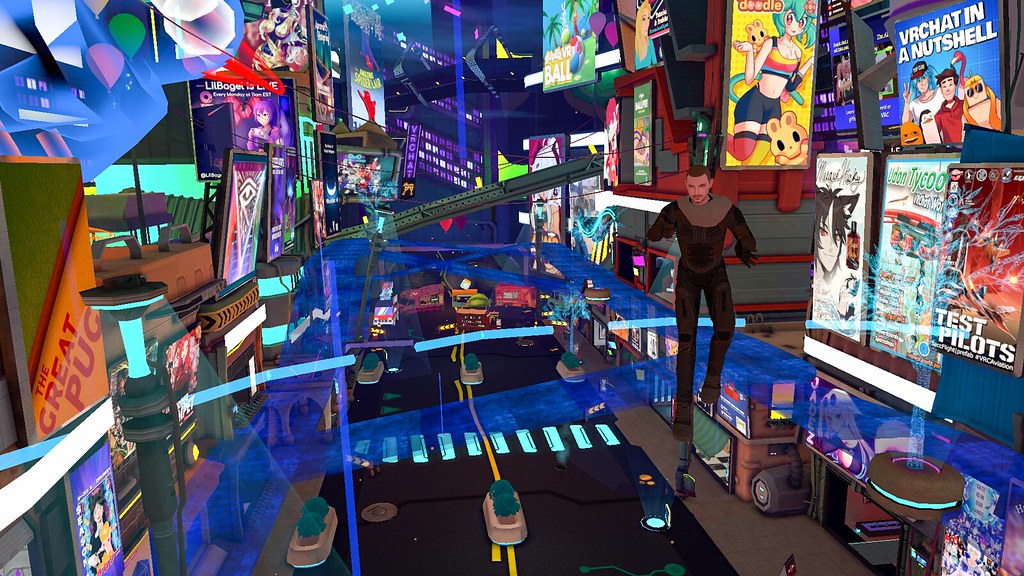No single entity owns the metaverse; instead, it’s a combination of tech giants, visionary startups, and empowered users who collaborate and contribute to its development. The metaverse is a dynamic, ever-evolving ecosystem with multiple stakeholders sharing ownership and control.
The metaverse is a rapidly growing, immersive digital world that has captured the imagination of millions.
As we dive headfirst into this virtual realm, we can’t help but wonder, who owns metaverse?
The answer is a complex web of power dynamics, with various players vying for control. This digital tug-of-war involves tech giants, startups, and even everyday users like you and me.
So, buckle up, my friend, as we embark on a thrilling journey to unravel the enigma of metaverse ownership and the ongoing battle for virtual supremacy!
The Battle of Tech Titans: Who’s Leading the Metaverse Race?
The race to dominate the metaverse has attracted the attention of major tech giants. 🌐 These industry leaders are investing heavily in creating immersive, interconnected digital experiences. But who’s leading the pack?
Facebook: A Metaverse Behemoth
Facebook (now Meta) has made no secret of its metaverse ambitions. 💪 CEO Mark Zuckerberg has committed to transforming the social media giant into a metaverse company. With the acquisition of Oculus and the launch of Horizon Workrooms, Facebook is definitely a force to be reckoned with.
Microsoft: The Power of Integration
Not far behind is Microsoft. 🚀 The company already boasts a robust ecosystem of products, including HoloLens, and Mesh. By integrating these services into a cohesive metaverse experience, Microsoft aims to become a top contender in the race.
Google: Mastering Data and AI
Google’s expertise in data and AI gives it a unique edge. 🧠 The company has dabbled in virtual reality (VR) and augmented reality (AR) through projects like Google Earth VR and ARCore. Keep an eye on Google as they make strategic moves to expand its metaverse presence.
Apple: The AR/VR Wild Card
Apple’s secretive nature makes it hard to pinpoint their exact metaverse plans. 🕵️♀️ However, the tech giant is rumored to be working on AR/VR headsets and developing an AR ecosystem. Apple’s history of disrupting industries makes it a wildcard to watch.
Amazon: The E-commerce Metaverse Vision
Finally, Amazon’s foray into the metaverse revolves around its e-commerce empire. 💼 The company has explored AR shopping experiences and virtual retail spaces. Amazon’s vast resources and customer base could propel it to metaverse success.
The metaverse race is far from over, and the battle of tech titans is just heating up. 🔥 As new developments emerge, the landscape of metaverse ownership will undoubtedly continue to evolve. So, stay tuned, and let’s see who comes out on top! 🏆
Visionary Startups: New Contenders for Metaverse Ownership
While the tech giants battle it out for metaverse dominance, a slew of visionary startups are entering the fray with innovative ideas and disruptive technologies. 💡 These newcomers are shaking things up and carving their niche in the metaverse landscape.
Decentraland: A User-Governed Virtual World
Decentraland is a decentralized virtual world where users own and control the land. 🌐 Built on the Ethereum blockchain, it allows for the creation, trading, and monetization of virtual real estate and digital assets. This unique governance model challenges the concept of centralized ownership.
The Sandbox: Gaming Meets the Metaverse
The Sandbox is a blockchain-based virtual world that combines gaming with metaverse experiences. 🎮 Users can create, buy, and sell digital assets while participating in interactive games and events. By empowering creators and gamers, The Sandbox offers an alternative to big tech metaverse visions.
Somnium Space: A Seamless Blend of VR and Blockchain
Somnium Space seamlessly blends VR and blockchain to create an immersive metaverse environment. 🕶️ Users can buy land, create content, and engage with others in this interconnected virtual world. With its focus on cutting-edge technology, Somnium Space is a contender to watch.
Cryptovoxels: Building a Pixelated Metaverse
Cryptovoxels brings a unique, pixelated aesthetic to the metaverse. 🎨 This user-owned virtual world allows participants to create, buy, and sell digital assets while engaging with others in a shared online space. Cryptovoxels offers an alternative vision of the metaverse, driven by creativity and collaboration.
Axie Infinity: Pioneering Play-to-Earn Gaming
Axie Infinity is a play-to-earn game that incorporates blockchain and NFTs. 🐾 Players can earn tokens by breeding, battling, and trading their digital creatures known as Axies. The game has amassed a dedicated community and could potentially pave the way for more play-to-earn experiences in the metaverse.
These startups are defying the odds and challenging the status quo in the race for metaverse ownership. 🚀 As they push the boundaries of what’s possible, they’re redefining the very concept of the metaverse itself. The future is bright for these innovative contenders! ☀️
User Empowerment: Our Role in Shaping the Metaverse

As the metaverse continues to grow and evolve, we—the users—hold a significant stake in shaping its future. 🌟 Our participation, creativity, and influence will determine how the metaverse develops and how ownership is defined. Let’s dive into the critical ways users are driving the metaverse.
User-Created Content: The Lifeblood of the Metaverse
The metaverse thrives on user-generated content (UGC). 🎨 Our creations—whether it’s art, music, games, or virtual experiences—bring the metaverse to life. As users, we’re essential in determining which platforms succeed and which ones falter.
Power in Numbers: Forming Virtual Communities
We’re not just individual users; we’re also part of vibrant virtual communities. 🌍 By banding together and forming social groups, we have the power to influence the direction of the metaverse. Our collective voice can shape policies and practices, ensuring that the metaverse aligns with our values and interests.
Monetizing Our Virtual Existence: NFTs and Beyond
The metaverse enables us to monetize our creations and even our virtual selves. 🤑 Non-fungible tokens (NFTs) have revolutionized the way we buy, sell, and trade digital assets. As we continue to explore new ways to generate income in the metaverse, we’re pushing the boundaries of what it means to “own” virtual assets.
The Decentralized Metaverse: Championing User Ownership
Decentralization is a powerful force in the metaverse. 🌐 Platforms like Decentraland and The Sandbox are pioneering user-centric ownership models. As we support and engage with these decentralized platforms, we’re actively shaping the future of metaverse ownership.
Demanding Transparency and Fairness
As users, we have the power to demand transparency, fairness, and inclusivity from metaverse platforms. 📣 By advocating for our rights and holding companies accountable, we can influence the policies that govern the metaverse and ensure that it remains an open, accessible space for all.
In the end, it’s up to us—the users—to play an active role in shaping the metaverse. 🙌 By participating, creating, and advocating for our rights, we can make our mark on the virtual world and help determine who truly “owns” the metaverse. Together, we can shape the future of our digital existence! 💪🚀
Intellectual Property: Navigating the Complexities of Ownership

Navigating the complex world of intellectual property (IP) is crucial when it comes to metaverse ownership. 🧩 As the lines between the virtual and physical worlds blur, understanding IP rights and protections becomes even more critical. Let’s delve into the key aspects of IP in the metaverse.
Protecting Your Creations: The Importance of IP Rights
As a user, protecting your creations in the metaverse is vital. 🛡️ Understanding copyright, trademark, and patent laws can help you safeguard your work from infringement. Stay informed about the ever-evolving IP landscape and ensure that your virtual assets are secure.
The Rise of NFTs: A New Frontier for IP
Non-fungible tokens (NFTs) have transformed how we view IP in the metaverse. 🖼️ NFTs provide a mechanism for proving ownership and authenticity of digital assets. However, they also introduce new challenges in IP enforcement. As NFTs continue to gain traction, understanding their implications for IP is essential.
Cross-Platform IP Challenges: A Legal Minefield
The metaverse is an interconnected web of platforms, and IP rights can become entangled across multiple virtual spaces. 🕸️ Navigating cross-platform IP issues can be a legal minefield. Stay vigilant and be prepared to defend your rights, even when crossing metaverse boundaries.
Collaborative Creation: Shared Ownership Dilemmas
Collaboration is a cornerstone of the metaverse experience. 👥 However, when multiple users contribute to a single creation, the question of ownership becomes more complex. Clearly defining ownership and responsibilities upfront can help avoid disputes and maintain harmony within the metaverse community.
Global IP Rights: Tackling Jurisdictional Challenges
The metaverse transcends physical borders, and IP rights can vary from country to country. 🌐 Understanding global IP protections and navigating jurisdictional challenges are crucial for ensuring your creations are protected worldwide. Stay informed and be prepared to adapt to an ever-changing legal landscape.
In conclusion, understanding and navigating the complexities of IP ownership in the metaverse is essential for creators and users alike. 🌟 Stay informed, protect your creations, and collaborate responsibly to ensure a fair and balanced metaverse experience for all. 🚀
Future of Ownership: Collaborative Control in the Metaverse?

The metaverse is evolving, and the future of ownership may involve a more collaborative approach. 🤔 In this brave new world, individuals, companies, and users work together to create an ecosystem that benefits everyone. Let’s explore the key aspects of collaborative control in the metaverse.
Power to the People: Decentralized Platforms
Decentralized platforms like Decentraland and The Sandbox are driving a shift towards collaborative control. 🌐 These platforms empower users to:
- Own virtual land and assets
- Create and monetize content
- Participate in governance decisions
As more decentralized platforms emerge, we can expect a growing emphasis on user empowerment and collaborative control.
Collaboration in Creation: Co-Ownership of Virtual Assets
In the metaverse, users often collaborate to create virtual assets. 🎨 This collaborative approach has led to innovative co-ownership models, where multiple parties share ownership and profits. As the metaverse continues to evolve, we can expect more:
- Joint ventures
- Partnerships
- Profit-sharing arrangements
The Wisdom of the Crowd: Decentralized Autonomous Organizations (DAOs)
Decentralized Autonomous Organizations (DAOs) are reshaping the future of ownership in the metaverse. 🚀 DAOs are blockchain-based organizations that enable:
- Decentralized decision-making
- Transparent governance
- Community-driven initiatives
With the rise of DAOs, we can expect to see more users participating in the management and control of virtual spaces.
Ownership in the metaverse will likely be a blend of centralized control and decentralized collaboration, creating a dynamic and ever-evolving landscape.
Bridging Worlds: Cross-Platform Collaborations
As the metaverse grows, cross-platform collaborations become more prevalent. 💡 Companies and users from different platforms will come together to:
- Share resources
- Co-create content
- Leverage each other’s strengths
These collaborations will further blur the lines between virtual worlds, fostering a sense of shared ownership across the metaverse.
A Call to Action: Users’ Role in Shaping the Future
The future of metaverse ownership is in our hands, and it’s up to us to ensure it evolves in a way that benefits everyone. 🙌 By:
- Supporting decentralized platforms
- Participating in DAOs
- Engaging in cross-platform collaborations
We can help create a metaverse that promotes collaborative control and empowers its users.
The future of ownership in the metaverse is a fascinating and complex topic. With the rise of decentralized platforms, DAOs, and cross-platform collaborations, we can expect a more collaborative and user-centric approach to control in the virtual world. Embrace the change and help shape the future of the metaverse! 🌟
Conclusion
In conclusion, the future of ownership in the metaverse seems to be heading towards a more collaborative and user-centric approach, as demonstrated by the rise of decentralized platforms, DAOs, and cross-platform collaborations.
While it’s difficult to predict the exact trajectory, it’s evident that the power dynamics are shifting, giving users an increasingly significant role in shaping the metaverse.
Embrace the change and contribute to creating a virtual world that fosters collaboration, empowers users, and benefits everyone.




